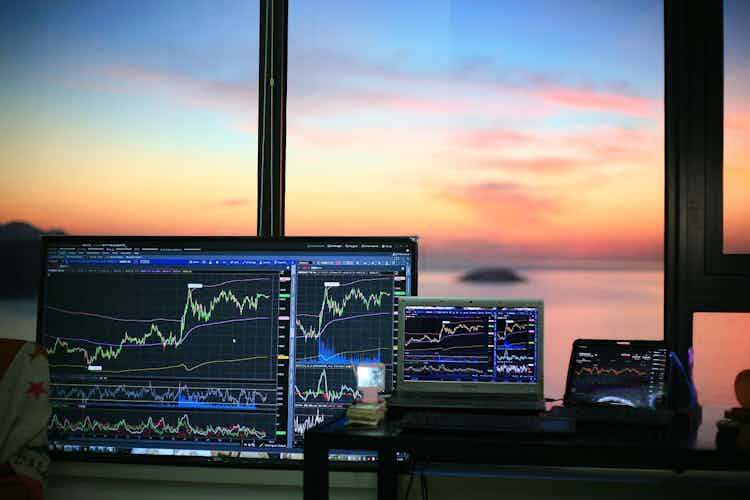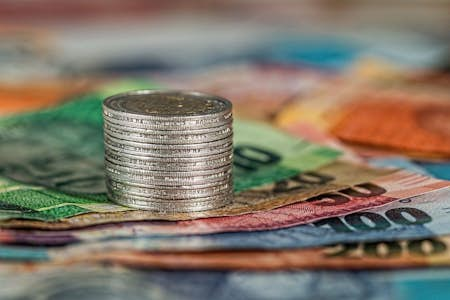If you want to grow any savings to have the largest amount possible for retirement, you may be interested in learning about investments outside of the stock market or savings accounts. Forex trading has gained more popularity for the standard retail trader in recent years as online trading platforms have made the investment class more accessible. However, just because it is accessible does not necessarily mean it is a good idea. Here, we look at whether generating a return from differing fluctuations in an exchange rate makes for a sustainable long-term investment strategy.
Discover the UK's leading investment platforms, whatever your investment goals. Click on a provider below to get started!
What is a sustainable long-term investment strategy?
Before looking at whether Forex, in particular, is a sustainable long-term investment strategy, it is vital to fully understand the broader idea of what a sustainable long-term investment is in the first place. A sustainable long-term investment strategy is when money is invested so that a dependable income stream and growth are achieved.
As ever with investments, what makes a sustainable investment with a reliable income stream that generates growth is different from investor to investor. That's down to the differences in situations and circumstances that determine what a person is looking for from investing. To some, a reliable income stream does not need to be huge. To others, having a substantial income that makes up for a shortfall in a pension pot is essential.
Additionally, not all investors will be concerned with an income stream. Income streams tend to be earned from dividends, bond repayments (coupons), or rental income from a property. Instead of receiving that income, investors may be more concerned about either capital preservation or capital growth. As a result, a long-term investment strategy for such individuals will mean they do not incur any losses to their initial investment amount.
What is investing in Forex?
It is essential to understand this complex market to ascertain if it can become a sustainable long-term investment for you.
Forex is one of the biggest global markets out there. It is short for Foreign Exchange, and it is the practice of exchanging one currency for the other. For example, changing the British Pound for the US Dollar or Japanese Yen. While, technically speaking, that means every time you exchange some money to go on holiday, you are conducting a Forex trade, the idea of using Forex as an investment class is different. Forex trading is making returns from many Forex trades and not using the exchanged money to buy local goods or services. Exchange rates are quoted in pairs, like GBP/USD or USD/JPY. That means you would be exchanging the British Pound for the US Dollar or the USD Dollar for the Japanese Yen, respectively.
Returns can be made for the following reasons. One way is if exchange rates are not balanced (through arbitrage). The other is if an investor correctly foresees that a currency is undervalued or overvalued by the broader market.
Arbitrage
Arbitrage works by identifying an imbalanced exchange rate between three currencies. By identifying an imbalance, it is possible to make money from the differences in the rates. These imbalances can materialise between three currencies, two of which value another currency differently.
For example, say you identify an imbalance between the exchange rate of the Swiss Franc, the Euro, and the British Pound. The exchange rates are currently:
GBP/CHF: £1 buys 2 Swiss Francs
EUR/CHF: €1 buys 2.5 Swiss Francs
EUR/GBP: €1 buys £1
To make money from this, you exchange your £1 for €1 and then buy 2.5 Swiss Francs. You then exchange those 2.5 Swiss Francs for £1.25 given the current exchange rate. So you have made 25p if no Forex broker fees were charged.
Undervalued or overvalued currencies
If a Forex broker or investor believes a currency is undervalued, they buy it cheaply and then sell it when they think it has achieved a more reasonable price. Once that price has been reached, you convert the currency back to your base currency and pocket the profit.
For example, you may believe that the Australian Dollar (AUD) is undervalued against the British Pound. For instance, you can buy 4AUDs for £1. But you think it actually should be closer to 2AUDs for £1.
You buy an Australian dollar position to hold on to it by purchasing 40AUDs for £10. When the exchange rate starts to value the AUD more highly against the pound and reaches 2AUDs for £1, you sell your position. Doing so means you receive back £20, making £10 overall.
If you believe a currency is overvalued, you do the opposite by selling the currency you think is too expensive. If you do not own that currency already, it is possible to short sell it to still profit from the fluctuating exchange rate.
What makes investing in foreign currency a sustainable long-term investment?
Several factors make investing in foreign exchange a highly attractive asset class. While these factors will never guarantee positive future results, they are certainly benefits that can help make it a more sustainable long-term investment than some may immediately think.
Liquidity
Investing in a highly liquid asset is always advantageous. If an asset is liquid, you have the comfort in knowing that you can sell it almost as soon as you want to. That is especially the case in the foreign exchange market. The market has so many market participants, and is open all day, five days a week, that you can be assured that you can sell your asset should you wish or need to at the moment you want. From Hong Kong to New York, finding an investor willing to deal with you will be possible.
That’s crucial as you may need the money you have invested in a currency to either invest elsewhere or perhaps simply to put towards your day-to-day costs in retirement. Of course, the value of your investment may not be as high as you had wanted it to be, but the point is if you need the cash there and then, you can do so. Less liquid assets, which even stocks and bonds can be compared to foreign currency, can sometimes take a little longer to sell.
What makes that a long-term investment strategy is that you can at least rely on Forex to be a sellable asset when you need to access funds quickly. That is an immense comfort for anyone, particularly those in retirement who no longer receive a salary.
Cumulative gains
As we will discuss below, Forex can be a highly volatile asset. That often deters people from investing in it in any meaningful way. However, like other asset classes, it is possible to make cumulative gains that can add up to a difference in your portfolio over the long term. While investing in Forex may be more labour intensive due to how often you will likely want to trade, the cumulative gains that can be achieved can add up to a substantial return.
Many traders find that they can make a material impact on the overall gains in their portfolio even when their currency pairs move by the smallest of decimal places. That’s a significant advantage to have when looking at Forex as a sustainable long-term strategy, as cumulative gains are then compounded by the ability to invest more cash on the back of those wins. Overall, the effect in a broader portfolio can be material and therefore of much importance to an investor looking at retirement and growing their wealth.
Diversification
One advantage to Forex is that it adds diversification to your portfolio. Diversifying your portfolio is a concept many fund managers would recommend. It is a way of reducing some of the risk of loss within your investments over a long period. If you were to invest solely in one asset class, you are hugely sensitive to the broader market movements of that particular asset on any day. That's because different assets react to the news cycle differently from others. By investing in several asset classes, if one of your asset classes in your portfolio has a bad day or month, other asset classes can help soften that blow.
When it comes to Forex, it will react in differing amounts or directions to assets like bonds, ETFs, stocks or commodities. That's crucial to making it a sustainable long-term investment. For, while it may come with a heightened risk in comparison to safe-haven assets like bonds, it can help diversify your portfolio to reduce its overall risk and hopefully improve its returns.
Of course, it is also possible to diversify your investments within Forex. Safer currencies are primarily perceived to be the more traditional currencies from developed countries like the US Dollar, the British Pound or the Euro. It is then possible to invest in other more volatile currency pairs like AUD/JPY.
Vast market
Finally, one massive benefit to Forex and its suitability as a long-term investment strategy is that it is such a vast market. As mentioned above, that opens up the ability to diversify within the asset class. However, it also means there should always be an opportunity to invest in something that has the potential to generate returns. While that may need in-depth technical analysis and the ability to stay on top of real-time data, it does mean that your cash is not sitting languishing in a low-interest rate savings account.
The market is even bigger when you consider the over-the-counter (or OTC) market, derivatives, CFDs and exotics that help support Forex and make it even more liquid. Moreover, it means you can always gain exposure in one way or another to a currency pairing or movement that you believe may generate a much-needed return in the future.
What are the risks of Forex investing for the long term?
Of course, there are risks involved with any investment class. With Forex, there is a great deal of hesitancy regarding investor sentiment for good reason. The threats it poses can sometimes be too much for some, especially when considering a long-term investment strategy that offers sustainable returns.
Interest Rates
Interest rates are intrinsically linked to Forex returns. Interest rates are, as a result, perhaps the most significant influence on the Foreign Exchange market as a whole. To a certain extent, therefore, investors in the asset class are highly sensitive to changes in Government policy and changes to a Government's economic agenda. Most recently, we have all been living in a world with low-interest rates for an extended period. However, this looks set to change worldwide for many developed economies where inflation is starting to rear its head.
Some Forex traders argue that interest rate risk can be mitigated by focusing on key economic indicators from a country and the global economy. As interest rates in each country change, they change at different rates. That is what causes a great deal of fluctuation between exchange rates and creates the ability to make money for traders. However, some investors argue that there is a high degree of risk with Forex due to the likelihood of surprise announcements by Central Banks. For example, the Bank of England recently kept interest rates the same in the UK, when it was widely anticipated that its' Monetary Policy Committee would vote to increase the base rate by a quarter of a per cent.
Therefore, when it comes to a long-term strategy, the question is how comfortable you are as an investor keeping an eye on these economic indicators and the chance for shock announcements.
Volatility
Another reason so many investors like to steer clear of Forex as a long-term strategy is its prevailing volatility that characterises even the shortest periods. Currency price movements are constant, and as a result, it can be hard to predict gains as volatility so often clouds an investor’s ability to foresee the direction of change.
That being said, many investors see volatility in the Forex market as a good thing. They use it to their advantage by taking profits quickly from any price rises and selling out of positions with stop-loss orders to minimise downside risk. What many investors do not like about using volatility in the Forex market in this way is how intensive it is to ensure that the cumulative gains are made. In contrast, cumulative losses are kept as small as possible.
Compared to a buy and hold strategy in the equity market, which sees an investor identify a stock they believe to be undervalued to then buy and hold it for several years, buying and selling Forex to make quick wins from volatility is exceptionally demanding. On top of that, it is still necessary to do the research required, as with equity or bond investing, to help make the best trades possible. That may not deter some investors, but to others, it may be too risky a long-term investment strategy with less of a chance of producing sustainable returns.
Large losses
Because many of the gains derived from Forex are made with the smallest of decimal movements, investors often leverage their positions to maximise their profits to make meaningful absolute returns. However, the downside of that is that any losses are magnified, too. When it comes to a long term investment strategy for a retirement pot, that may well put investors off the idea of Forex entirely.
While retirement may be a long way off for some, for others, retirement day is looming, and the ability to recoup significant losses is much reduced. Plus, some individuals, long investment timelines or not, may not have the ability to absorb substantial losses. To others, there may simply not be the need even to risk making those losses for a chance of returns.
Therefore, in terms of being a long-term sustainable investment strategy, considering Forex is possible for those whose risk profile allows. On the other hand, it may not be suitable for those with a low appetite for risk due to those potentially significant losses. However, some may be happy to risk those losses by choosing less volatile currency pairs and reducing the amount of leverage used.
Types of currency trading strategy
If you believe, upon balancing out the risks and benefits of Forex, that it is a suitable long-term investment strategy for you, there are several ways you can look to make gains through it. The following strategies are prevalent within the Forex market:
High trading volume
This strategy has been briefly alluded to before in this article, but a common way to make returns from Forex is to trade regularly and in large volumes. Large volumes can mean leveraging while trading frequently to make use of market volatility - the process of scalping. It is the idea that you take profits as soon as they are made to profit immediately. On the flip side, you do not hold onto the asset long enough for it to fall too far in value. Over the long term, by doing this repeatedly, the idea is that you build up a reliable return.
Buy and hold
Of course, in comparison to scalping and high trading volume strategies, one very long term investment strategy is simply to buy and hold onto a currency that you believe to be materially undervalued. Doing so is very similar to how equities are often traded, hoping that the price will appreciate in the future. The problem with this strategy is that you have to be comfortable with all the volatility between buying and selling the asset. Given how quickly and drastically the Forex markets can move, you will need to have confidence that even if your initial investment loses a great deal of value in one day, you will make that back.
Hedging
Hedging positions is a means of trying to profit from whatever happens in the Forex markets. In doing so, you are trying to materially reduce your exposure to losses while also gaining from the upside. In reality, doing so will dampen your profits as you will always be in losing a position as well as a winning one. However, how you structure those hedging positions will allow you to make some gains, but it also buys you more time. Hedging allows you to see what direction markets are moving in and if any lasting trends are there to make profits on. For those looking to make a long-term sustainable return from Forex, hedging can be highly effective when implemented appropriately.
Previous past performance
While past performance is never a reliable indicator of future performance, or so the FCA tells us, there are traders out there that implement a strategy of looking at past performance to generate returns over time. They do so by looking at previous levels of exchange rates that met resistance - both on the downside and upside.
By identifying where the market broadly thinks two currencies should sit in terms of exchange rate, traders can then profit from movements in between those two levels if implemented effectively. It is the process of identifying signals as to when to enter and exit a position. This strategy can help a trader drown out larger market noise like reactions to Government policy and zone in on short term fluctuations.
Derivatives and CFDs
While strictly not an investment strategy like scalping, buying derivatives and CFDs based on currency pairs can sometimes be an effective means to make returns. While they can be prone to massive losses, one of the advantages of these products is that you do not have to hold the underlying asset itself.
Therefore, when it comes to Forex, you can simply take a position with another trader about what direction you believe a currency will move in. It is a way you can magnify your gains quite quickly, but consequently, also magnify your losses. CFDs are not even permitted in several countries around the world for that reason, with a high degree of regulatory oversight in others, as it is in the UK.
Is Forex a good long-term investment?
As with any investment, whether it is good or not can only ever really be decided with the benefit of hindsight. To ensure that you improve your chances of making an excellent long-term investment, it is essential you fully understand the risks that investing your money in Forex can pose.
That volatility and potential for significant losses should ring massive alarm bells for anyone zoning in on retirement day with less in their pension pot than they would like. While Forex could be a way to make up that small hole, it also can make it even more significant. Therefore, Forex also needs to be considered alongside all the other investments you have in your portfolio and whether it is suitable to your circumstances and risk profile.
Forex does have the potential to produce sustainable returns for investors. Still, it also has the potential for returns to be lumpy and turn quickly to negative numbers. Therefore, it is essential to understand how to mitigate against the chance of that happening before stepping foot in this vast market.







